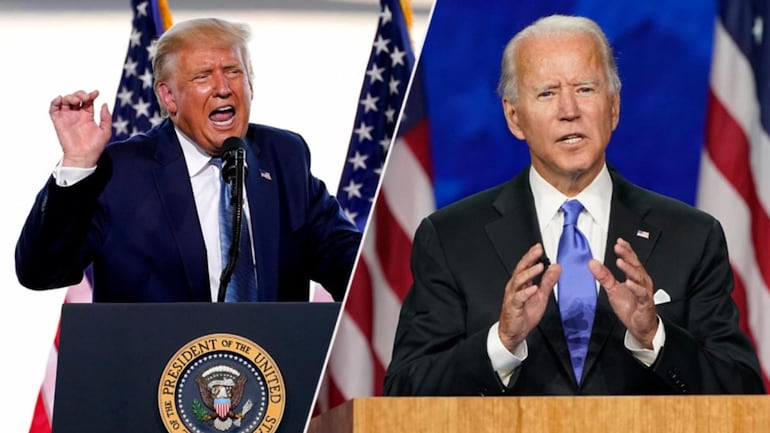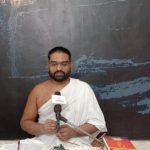Original Published on – https://www.gmfus.org/
Engy Abdelkader (Visiting Fellow, The German Marshall Fund of the United States)
In 1952, Republican President Dwight D. Eisenhower received an identical percentage of support (59 percent) among Americans who participated in religious services as those who did not. Today, the so-called “God Gap”—the difference between the voting patterns of religious practitioners versus those who are less observant—is an ostensible fixture of the U.S. political landscape.
Since the 1990s, the Republican Party has attempted to present itself as the party of traditional moral values emphasizing personal piety. Republicans tend to attend church frequently and enjoy high levels of education. According to conventional wisdom, the most religious Americans are likely to be Republicans while the least observant are Democrats. But, voting patterns among distinct minority faith groups belies this apparent truism.
Indeed, the “God Gap” arguably holds true only if religiosity is solely measured by attendance in religious services rather than other equally important variables. According to the Pew Research Center, for instance, several minority faith communities regard religion as “very important” in their lives and have consistently voted for the Democratic presidential candidate in the general elections. Representative are Black Protestants, Jewish Americans, and Muslim Americans, whose faith-based commitment to social-justice values have informed their liberal voting pattern for decades.
This is an important observation during a critical U.S. presidential election when some political leaders may exploit tokenized minority representation in campaign appeals to marginalized group voters. Instead, elected officials and those aspiring to public office should demonstrate a principled commitment to substantive policy positions that ensure equal justice for all, from racial justice reform to immigration to healthcare.
Black Protestants
Originally conceived as a response to oppression and discrimination, Black churches have enjoyed a powerful role in African American history. Since the nation’s inception, they have represented a pillar of the community and a source of empowerment. During the Civil Rights Era, for instance, many black clergy encouraged parishioners to participate in the marches, protests, and sit-ins demanding equality. Today, Black churches tend to be politically active because of their commitment to social-justice values.
Since the inclusion of African Americans in the electorate, these values have shaped the community’s voting behavior. One of the most religious groups in the United States, Black Protestants favor an activist government due to systemic racial oppression culminating in the highest rates of unemployment and the lowest levels of economic security. In addition to income and wealth disparities, racial inequality also manifests itself in voter suppression, racial profiling, warrantless surveillance, police brutality, mass incarceration, housing discrimination, and disproportionate hate-crime rates. Due to the salience of social-justice issues, this minority faith group embraces the Democratic Party. While 70 percent of highly religious evangelical Protestants and Mormons identify as Republicans, Black Protestants are the least likely to identify as Republican (14 percent). Conversely, according to Pew, approximately 85 percent of them regard religion as “very important” in their lives.
Jewish Americans
Jewish Americans have similarly adopted liberal social and political positions that influence their voting patterns. Although this group comprises one of the highest-status groups in the United States, it maintains a firm commitment to social justice values. Due to a specific history of persecution, this minority faith group continues to feel vulnerable to anti-Semitism. As such, it remains apprehensive of those who promote racism, xenophobia, and intolerance.
In light of prior historical experiences, Jewish Americans learned that the left favored the cause of minorities and have overwhelmingly voted for Democratic presidential candidates. Even if they do not benefit directly from liberal social programs, they tend to view these as a safeguard against the social tensions that breed religious bigotry. Additionally, liberalism has ensured the separation of church and state that has facilitated Jewish economic success.
In previous years, as is the case now, some predicted that Jewish Americans would increasingly join the ranks of the Republican Party. Relevant factors cited as causes of this include urban unrest, affirmative action, and concern about Israel’s well-being. However, voting patterns show that they remain and favor liberal policies on a wide range of issues. Scholars have explained that is largely due to Jewish anxieties about evangelical Protestants’ influence in the Republican coalition that may pose a threat to religious pluralism and equality. According to Pew, approximately 71 percent of Jewish Americans deem religion as “very important” or “somewhat important” in their lives.
Muslim Americans
Muslim Americans began coordinating politically to vote as a bloc in presidential elections in the 1990s. The 1996 contest was the first where this group was deemed politically engaged. Its potential political power rests in the fact that it is concentrated in presidential battleground states. According to the Public Religion Research Institute, some of the highest populations of Muslims citizens are found in Ohio, Michigan, Georgia, Minnesota, Pennsylvania, and North Carolina.
In 2000, more than 70 percent of Muslim Americans voted for Republican presidential candidate George W. Bush. Most of the 70,000 Muslim votes in Florida went to Bush who won the state with a mere 537 votes after a prolonged recount and legal battle in the Supreme Court. At that time, Muslim Americans were viewed as naturally aligned with Republicans because they held socially conservative values, supporting traditional marriages while opposing abortion.
But 9/11 changed everything. Consequent policy initiatives during the Bush administration—from warrantless surveillance of mosques to religious profiling at airports—consistently infringed on civil rights, human rights, and the rule of law. Today, Muslim Americans are the religious group most likely to report having experienced religious discrimination. Similar to their Black and Jewish counterparts, experience with oppression has inspired a renewed commitment to social-justice values from Muslim Americans, from promoting and protecting civil rights, to advocating for racial justice reform.
These faith-based values are similarly evidenced in voting patterns. For nearly two decades, Muslim Americans have voted for the Democratic presidential candidate in U.S. general elections. In 2004, more than 90 percent of them voted for John Kerry. In 2008 and 2012, 89 percent and 85 percent of them voted for Barack Obama, respectively. Similarly, in 2016, 78 percent of Muslim voters cast a ballot for Hillary Clinton. According to Pew, 64 percent of Muslim Americans regard religion as “very important” in their lives.
Reconsidering the “God Gap”
Arguably, it is time to reconsider the “God Gap” as no party enjoys a monopoly on religion. Clearly, many religious Americans vote in favor of liberalism while conceptualizing piety differently from Evangelical Protestants, for example, who overwhelmingly vote Republican. Black Protestants, Jewish Americans, and Muslim Americans are minority faith groups that deeply value religion’s role in their daily lives while concurrently prioritizing social justice values over moral traditionalism. As political candidates engage in God-talk, a mainstay in U.S. politics, they should embrace a new understanding of morality that prioritizes equal justice for all in both word and deed.
The views expressed in GMF publications and commentary are the views of the author alone.
Also read:-Sadhguru’s Spiritual Tour Across the USA on Motorbike!
Also read:-Survey shows faith can prosper in online services
Courtesy : https://www.gmfus.org/
[video_ads]
[video_ads2]









